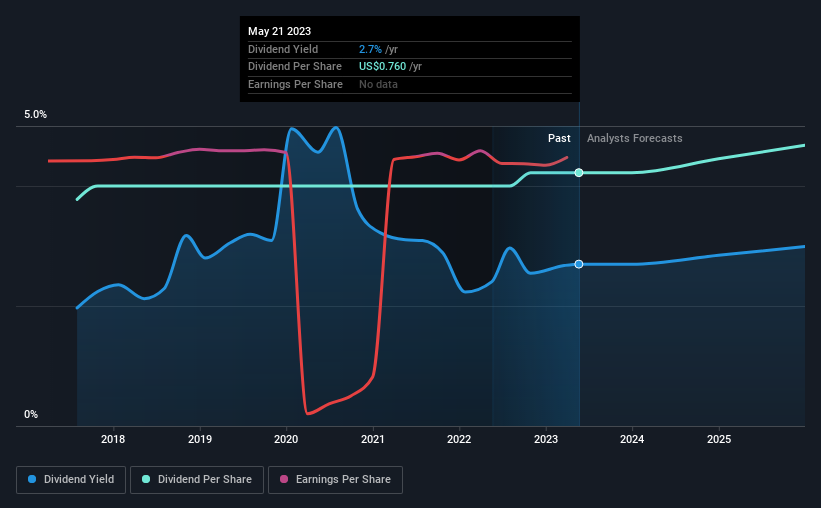Why It Might Not Make Sense To Buy Baker Hughes Company (NASDAQ:BKR) For Its Upcoming Dividend
Regular readers will know that we love our dividends at Simply Wall St, which is why it's exciting to see Baker Hughes Company (NASDAQ:BKR) is about to trade ex-dividend in the next 4 days. The ex-dividend date is one business day before a company's record date, which is the date on which the company determines which shareholders are entitled to receive a dividend. The ex-dividend date is important as the process of settlement involves two full business days. So if you miss that date, you would not show up on the company's books on the record date. Accordingly, Baker Hughes investors that purchase the stock on or after the 26th of May will not receive the dividend, which will be paid on the 9th of June.
The company's next dividend payment will be US$0.19 per share, and in the last 12 months, the company paid a total of US$0.76 per share. Based on the last year's worth of payments, Baker Hughes stock has a trailing yield of around 2.7% on the current share price of $28.17. We love seeing companies pay a dividend, but it's also important to be sure that laying the golden eggs isn't going to kill our golden goose! That's why we should always check whether the dividend payments appear sustainable, and if the company is growing.
Check out our latest analysis for Baker Hughes
Dividends are typically paid from company earnings. If a company pays more in dividends than it earned in profit, then the dividend could be unsustainable. Baker Hughes paid a dividend last year despite being unprofitable. This might be a one-off event, but it's not a sustainable state of affairs in the long run. Given that the company reported a loss last year, we now need to see if it generated enough free cash flow to fund the dividend. If cash earnings don't cover the dividend, the company would have to pay dividends out of cash in the bank, or by borrowing money, neither of which is long-term sustainable. Over the last year it paid out 60% of its free cash flow as dividends, within the usual range for most companies.
Click here to see the company's payout ratio, plus analyst estimates of its future dividends.
Have Earnings And Dividends Been Growing?
Companies with consistently growing earnings per share generally make the best dividend stocks, as they usually find it easier to grow dividends per share. If business enters a downturn and the dividend is cut, the company could see its value fall precipitously. Baker Hughes reported a loss last year, but at least the general trend suggests its income has been improving over the past five years. Even so, an unprofitable company whose business does not quickly recover is usually not a good candidate for dividend investors.
Many investors will assess a company's dividend performance by evaluating how much the dividend payments have changed over time. Since the start of our data, six years ago, Baker Hughes has lifted its dividend by approximately 1.9% a year on average.
Remember, you can always get a snapshot of Baker Hughes's financial health, by checking our visualisation of its financial health, here.
To Sum It Up
Has Baker Hughes got what it takes to maintain its dividend payments? It's hard to get used to Baker Hughes paying a dividend despite reporting a loss over the past year. At least the dividend was covered by free cash flow, however. With the way things are shaping up from a dividend perspective, we'd be inclined to steer clear of Baker Hughes.
Although, if you're still interested in Baker Hughes and want to know more, you'll find it very useful to know what risks this stock faces. Every company has risks, and we've spotted 1 warning sign for Baker Hughes you should know about.
If you're in the market for strong dividend payers, we recommend checking our selection of top dividend stocks.
Have feedback on this article? Concerned about the content? Get in touch with us directly. Alternatively, email editorial-team (at) simplywallst.com.
This article by Simply Wall St is general in nature. We provide commentary based on historical data and analyst forecasts only using an unbiased methodology and our articles are not intended to be financial advice. It does not constitute a recommendation to buy or sell any stock, and does not take account of your objectives, or your financial situation. We aim to bring you long-term focused analysis driven by fundamental data. Note that our analysis may not factor in the latest price-sensitive company announcements or qualitative material. Simply Wall St has no position in any stocks mentioned.
Join A Paid User Research Session
You’ll receive a US$30 Amazon Gift card for 1 hour of your time while helping us build better investing tools for the individual investors like yourself. Sign up here

 Yahoo Finance
Yahoo Finance 
